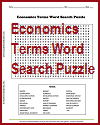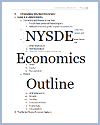| Introduction and Miscellaneous |
| www.studenthandouts.com > Social Studies > Economics > Introduction and Miscellany |
 |
 |
|||||||||
| Economics Terms Word Search Puzzle | NYSDE Economics Outline |
|
Economics students must be led to understand that an economic system refers to the set of rules, institutions, and arrangements that govern how goods and services are produced, distributed, and consumed within a society or a country. That an economic system serves as the framework that guides the allocation of resources, the organization of economic activities, and the distribution of the resulting outputs. That these economic systems can vary significantly from one society to another and are influenced by cultural, historical, political, and economic factors. That there are several types of economic systems, with the most common being the following. Our free printable worksheets are here to help you in educating your students on this fascinating and important subject. Market Economy (Capitalism): In a market economy, most economic decisions are made by private individuals and businesses. These decisions are guided by the forces of supply and demand in competitive markets. The government's role is typically limited to enforcing property rights, contracts, and ensuring fair competition. Examples of countries with market economies include, historically, the United States and many Western European nations. Planned Economy (Socialism or Communism): In a planned economy, the government or a central authority plays a dominant role in controlling and directing economic activities. The government often owns or controls key industries and resources and may allocate goods and services based on a planned production and distribution system. In pure communism, there is no private property ownership, and resources are commonly owned. Examples of countries with planned economies historically include the former Soviet Union and North Korea. Mixed Economy: Most modern economies are mixed economies, combining elements of both market and planned systems. In a mixed economy, there is a private sector where individuals and businesses make economic decisions based on market forces, while the government intervenes in specific areas, such as regulating industries, providing public goods and services (e.g., education, healthcare), and implementing social safety nets. Examples include the United States, Canada, and many European countries. Traditional Economy: In a traditional economy, economic activities are based on customs, traditions, and historical practices. These economies are often subsistence-oriented, with a focus on meeting the basic needs of the community. Traditional economies are less common in industrialized nations but are still found in some rural and indigenous communities. Command Economy: In a command economy, the government has centralized control over economic decisions, including what goods and services are produced, how they are produced, and for whom they are produced. Command economies are characterized by extensive government ownership and planning. They are rare today, with some aspects of command economies found in countries like Cuba. Islamic Economic System: In some predominantly Muslim countries, an Islamic economic system is followed, which incorporates principles of Islamic law (Sharia). This system prohibits certain economic activities such as usury (riba) and emphasizes social justice and wealth distribution. Green Economy: In recent years, there has been growing interest in green or sustainable economic systems that prioritize environmental sustainability and social well-being alongside economic growth. These systems aim to reduce environmental impacts and promote sustainability in economic decision-making. It's important to educate your students to recognize that economic systems can evolve over time, and no system is entirely static. Different countries and regions may adopt variations of these economic systems or combine elements from multiple systems to suit their specific circumstances and objectives. The choice of an economic system has significant implications for the distribution of wealth, economic growth, and the overall well-being of a society. Our free printable worksheets are here to help you teach these economics concepts. |
| www.studenthandouts.com > Social Studies > Economics > Introduction and Miscellany |






